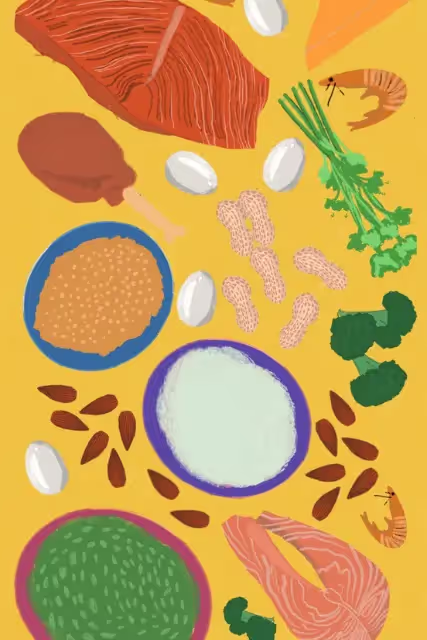While hair loss and fatigue are more visible signs, a protein deficiency can also affect the body’s muscle reserves






Editor's Note: From grocery lists, to fitness priorities, and even healthy snacking, protein is everywhere—but do we truly understand it? In this series, the Good Food Movement breaks down the science behind this vital macronutrient and its value to the human body. It examines how we absorb protein from the food we consume, how this complex molecule has a role to play in processes like immunity, and the price the Earth pays for our growing protein needs.
If you observe a lot of sudden hair loss, or if your nails look dull and chip every time you try to open a jar or can, you may want to sit up and take notice. Brittle hair and nails, if co-occurring and sustained, are often the first indicators of a protein deficiency.
Protein is part of every activity your body undertakes—the flutter of an eyelid, the contraction of a muscle, or the diffusion of oxygen into our cells. Hair, nail, and skin problems are usually the earliest manifestations of a protein deficiency. Proteins like keratin, collagen, and elastin make up skin, hair, and nails. When the body has limited reserves of protein, it prioritises tasks like tissue repair and is unable to perform other tasks—which in turn, show up as symptoms. In hair, this could result in thinning and hairfall. Similarly, nails could develop ridges and become more prone to breaking. Bereft of nourishment, your skin could become dry and flaky, or prone to acne, and melasma.
Another sign to look out for is feeling hungrier, especially if you are craving something sweet. Proteins decrease the level of ghrelin—the ‘hunger hormone’ which contributes directly to you feeling full and satiated. Thus, a protein deficiency can allow hunger pangs to thrive unfettered. Our bodies digest protein very slowly. When we consume a meal high in carbohydrates, without consuming enough protein to counterbalance them, our meal gets digested faster, resulting in a spike in blood sugar levels. This sharp spike is followed by a drop, and these fluctuations can make us reach for that bar of chocolate more often.
If the body's protein needs are consistently unmet through external sources, the body turns inwards towards one of its final reservoirs of protein: our muscles. Unbeknownst to us, our bodies may start breaking down muscle mass for essential functions like creating essential enzymes or repairing tissues. As your body chips away at muscle mass, it saps your strength, leaving you perennially exhausted. This can worsen if, despite using muscle mass, the body is not able to create enzymes important for digestion or nutrient absorption in a timely manner. The fluctuation in blood sugar levels also means that the body is unable to sustain energy levels through the day.
If the body's protein needs are consistently unmet through external sources, the body turns inwards towards one of its final reservoirs of protein: our muscles.
Some protein deficiencies can also cascade into other ailments. For example, if the body is not able to produce enough globins [a kind of protein involved in oxygen transport], then it is unable to produce sufficient haemoglobin despite having adequate iron. Thus, a protein deficiency can also cause anaemia. In anaemia, the red blood cells do not have adequate haemoglobin resulting in poor absorption of oxygen, and consequently, weakness.
These reasons—the body tapping into its internal reserves of muscle mass, the untimely production of enzymes, the fluctuation of blood sugar levels, and deficiencies in turn leading to other ailments—merge to result in the most insidious symptom of protein deficiency: chronic fatigue.
Also read: Whey to go: A complete guide to protein
Healing, recovery, immunity—compromised
With each step, the body is forced to choose which part of its upkeep to compromise. Beyond hunger, hair, and fatigue, indicators of a deeper deficiency surface, says Mumbai-based dietician Dr. Afsha Sheikh. Hereon, injuries are slow to heal, muscles ache persists, and antibodies find themselves far too outnumbered to oust pathogens. Bone tissue too grows brittle, increasing the risk of fractures from simple acts like jumping or dancing. The combination of slow recovery and poor immune response make the body vulnerable to frequent injuries and illnesses without being able to recuperate fully.

When broken down chemically, proteins are made up of amino acids. Some of these amino acids are necessary for the production of neurotransmitters. Their absence could result in lesser serotonin and dopamine production. Often termed the ‘happy hormones’, these neurotransmitters help regulate functions like mood and sleep, and their absence affects emotions as well as cognitive function.
The internet is teeming with advice, and it can be tempting to self-diagnose a protein deficiency. It is important to remember that our bodies don’t process nutrients in isolation, and that the same symptoms can surface as a result of different or overlapping deficiencies. If you spot any milder symptoms—like your hair and nails growing brittle—for over a fortnight, consult a dietician first, says Sheikh.
Addressing these symptoms rather than writing them off is crucial to catching any deficiency in time. If you already have the more severe symptoms like chronic fatigue and slow-healing injuries, then it is important to consult a physician first, and then work alongside a dietician.
Also read: Eating healthy: Is take-out cheaper than cooking at home?
{{quiz}}
References




.avif)






